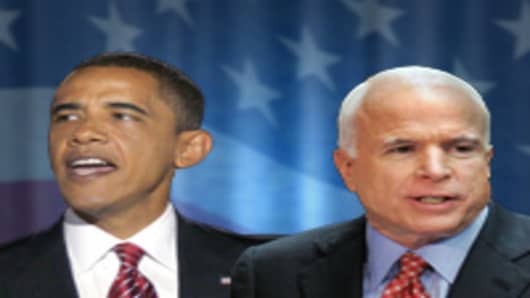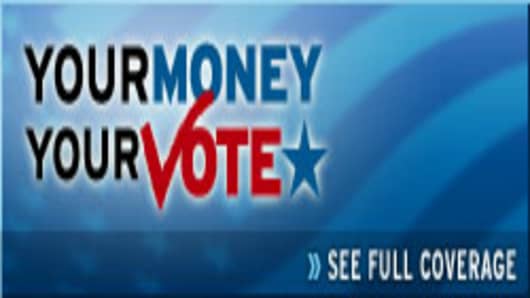Global stock markets rose to a two-week high as investors around the world focused on the US presidential election.
US stocks ralliedas investors looked forward to putting the uncertainty of the presidential voting behind them. Even a bigger-than-expected drop in US factory ordersdidn't push stocks lower.
In Asian trading, Japan's Nikkei index soared, while European stocks also rose. The dollar fell against most other major currencies, while gold prices rose.
- Is Obama the New Ronald Reagan?
- Unconventional Election Indicators
- Election Facts and Stats
"Traders are only focusing on one event for the next 24 hours, and that is the election." said Jonathan Kornafel, Asia director of U.S. based options trader Hudson Capital Energy.
Democrat Barack Obama was leading Republican John McCain in five of eight key battleground states, according to a series of Reuters/Zogby polls released on Tuesday.
Analysts have said market prices probably already reflected expectations of an Obama victory. But if Democrats tighten their control of Congress, it may be easier for the new administration to deal with the financial crisis.
"Depending on the actual results, the U.S. election may provide some support to markets globally as it may be seen as the promise of more fiscal stimulus, particularly if Obama wins," a currency strategist with Calyon in Hong Kong said.
Obama advocates a second stimulus package to jump-start the US economy. Valued at $175 billion, the plan would include funding for infrastructure and a round of tax rebates.
McCain wants a $300 billion housing plan that would use some of the funds from the recent $700 billion Wall Street bailout package to buy up troubled mortgages.
Still, analysts by and large do not believe that one candidate would boost the pummeled stock market more than the other.
For Investors:
- Trade the Vote: Investors' Election Strategies
- A November Rally in Store?
- Grab These Small-Caps, Before the Recovery
- Recession Special: Discount Retailer Stocks
In fact, they predict that stocks are headed for a recovery no matter who is elected, and that the policies of both McCain and Obama will be guided largely by the weak economy and recent flood of government intervention enacted to keep the global financial system from collapsing.
"The fact is, the passage of the U.S. election might actually come as a relief to the market rather than uncertainty, as once the election is done, the political spectrum of the US will be quite clear for the next four years,'' said Subodh Kumar, chief investment strategist at Subodh Kumar & Associates in Toronto.
Given how much the Dow Jones industrial average has shed this year—the index is down 34.2 percent from its Oct. 9, 2007 peak of 14,164.53— many market watchers believe the economy's weakness could be priced in already.
On Monday, the stock market closed narrowly mixed in light trading. The Dow did something that has become unheard of in recent months—it made just a single-digit point decline.
Still, the economic news continues to be grim.
US factory orders fell 2.5% in September, the Commerce Department said, more than economists had forecast. On Monday, the Institute for Supply Management revealed the worst monthly contraction in manufacturing activity and automakers reported the lowest level of U.S. car sales in more than 17 years.
Meanwhile, the interest rates banks charge each other for short term loans fell again Tuesday, providing further hope that measures to shore up the credit markets are taking hold.
The Treasury Department is considering using more of its $700 billion rescue package to buy stakes in a wide range of financial companies beyond just banks and insurers after tentative signs the program is working, according to the Wall Street Journal.
The paper cited sources familiar with the matter saying the companies in focus include bond insurers and specialty finance firms such as General Electric's GE Capital unit and CIT Group .
—Reuters and AP contributed to this report.



